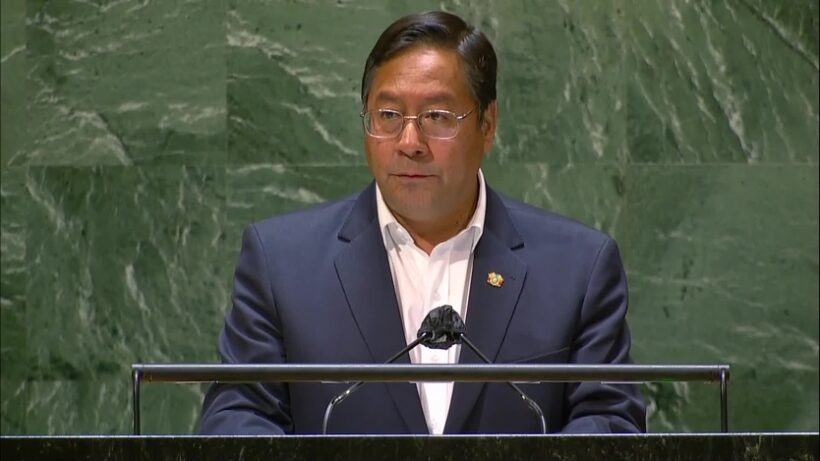The President of the Plurinational State of Bolivia participated in the 77th Session of the United Nations, where he stated that this forum “must allow us to continue strengthening multilateralism in order to confront more effectively the new and old threats that beset humanity”.
On the occasion, Arce declared that, “today we are facing a multiple and systematic capitalist crisis that increasingly endangers the life of humanity and the planet”, that it is necessary to identify “the origin of a system that reproduces the domination, exploitation and exclusion of the great majorities, that generates concentration of wealth in few hands and that prioritises the production and reproduction of capital before the production and reproduction of life”.
Bolivia’s rapid economic growth is based on rejecting the IMF and building a strong role for the state, President Luis Arce tells the UN General Assembly. pic.twitter.com/kUbVZ4q3po
— Kawsachun News (@KawsachunNews) September 20, 2022
The president made his proposals to the UN assembly in a numbered way:
1. To declare the world a zone of peace. Privilege dialogue between nations through people’s diplomacy. Multilateralism is the only mechanism that represents a system of respect between states, irrespective of their economic or military power.
2. Replace the construction of weapons of mass destruction with fair compensation for the world’s poor. Today, 9 countries have 9,705 nuclear warheads; 9,440 of them are in military stockpiles, ready to be used.
3. Against the commodification of health, “we will be proposing universal health systems”.
4. A global programme of food sovereignty in harmony with Mother Earth. Another manifestation of the crisis of capitalism is the food crisis. In 2021 alone a total of 828 million people were victims of hunger.
5. Rebuild the productive capacities of the countries of the periphery, hit by the unstoppable logic of capital concentration. “That is why today we must be governed by the principles of solidarity, complementarity and respect for the self-determination of peoples. The foreign debt must be relieved so that our countries can sovereignly implement comprehensive and sustainable social policies. We must change the terms of trade that today continue to benefit only the North. In the case of Bolivia, we do not and will not accept impositions from the International Monetary Fund. We are guided by the civilising principle of Living Well that emerges from our original indigenous roots.
6. The climate crisis requires responsibility, solidarity, harmony between human beings and nature, and not usury. Countries that have the capacity to change their production and consumption patterns do not have the political will to do so. “To reverse the climate crisis, we must resolve the contradictions of the capitalist model”.
7. Nationalisation of lithium for the benefit of the people and the energy transition. “We do not want that, like other riches, colonialism and capitalist development use it for the benefit of a few and the hunger of the people. We reject any kind of interference and destabilisation of democracy in our country with the aim of controlling lithium. According to what the commander of the US Southern Command said a couple of months ago, the so-called ‘lithium triangle’, located in South America and made up of Bolivia, Argentina and Chile, is in the US’s sights. But we are not chess pieces on a chessboard; we are people who work every day to get ahead and we have every right to decide about our natural resources.
8. From nationalisation to regionalisation of the fight against drug trafficking. “Continuing to put the emphasis on supply and not on demand has only served as a pretext for militarisation and for the international deployment of the war on drugs. This affects farmers in the South and leaves criminal groups, which have never been identified in countries with massive drug consumption, with absolute impunity.
9. Strengthen international mechanisms for preferential treatment for landlocked countries. “All Mediterranean or landlocked countries face serious difficulties in accessing the sea and exploiting its resources. All countries have the right to use ocean space. It has been shown that landlocked countries are doubly affected; we have higher costs in importing products and our development is hindered. My country was born with a sea, but today it is a landlocked country, forced by the circumstances of the past to face multiple barriers. We hope that, sooner rather than later, dialogue and diplomacy can triumph in order to repair the injustices of a war driven by capitalist interests and thus build a better future between brotherly peoples.
10. Broaden our narrow view of human rights and democracy.
11. Intergenerational solidarity and universal preoccupation with the older people who built the house of today’s youth with their work.
12. Declare the decade of depatriarchalisation to fight against all forms of violence against women and girls. “On a global level, we are specifically preoccupied by the violence suffered by impoverished indigenous women and girls. Patriarchy is the oldest system of oppression, which is complemented by colonialism and capitalism. We stand for the construction of reciprocal relationships, for a life free from all forms of exclusion, domination, exploitation, discrimination and violence for all of humanity and our Mother Earth”.
13. Reject unilateral condemnations. “It is inconceivable that unilateral measures are still applied with the aim of breaking governments at the cost of the hunger and suffering of their peoples. One example is the criminal blockade of Cuba by the United States, which puts the lives of millions of people at risk”.
14. To fully ratify the United Nations Charter and the principle of multilateralism. “The Plurinational State of Bolivia and its democratic and cultural revolution is optimistically committed to overcoming the current polarisation of the world architecture and overcoming the capitalist order that has drawn us into a dizzying, dangerous, unlimited race of consumerism, which puts humanity and the planet at risk.






